

« Les biens communs nous offrent davantage de liberté et de pouvoir que ne le font l’État et le marché. La notion de « biens communs » attire de plus en plus l’attention et l’intérêt de divers acteurs du changement social.
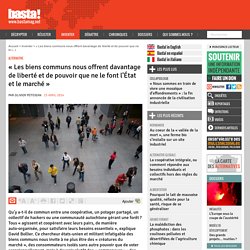
Qu’il s’agisse d’écologie, de défense des services publics, de culture ou de technologie, les biens communs – ou, plus simplement, les « communs » – ont pour principal attrait de dessiner une alternative pratique aux logiques de commerce et de contrôle, mettant l’accent sur la coopération et le partage, et redonnant du pouvoir et de l’autonomie aux simples citoyens. La notion de « biens communs » est invoquée à propos de choses très différentes entre elles, depuis la gestion collective des ressources naturelles jusqu’à Linux et Wikipedia, en passant par la préservation des traditions indigènes, les services et infrastructures publics, les coopératives et l’économie solidaire, les jardins partagés et les AMAP… Difficile parfois de trouver un fil conducteur.
Basta ! A New Alignment of Movements? Part I: The General Challenge. By Pat Conaty and David Bollier “In September 2014, the Commons Strategies Group convened a three-day workshop in Meissen, Germany, of 25 policy advocates and activists from a variety of different economic and social movements.

The topic of the “deep dive”: Can leading alt-economic and social movements find ways to work more closely together? Can there be a greater convergence and collaboration in fighting the pathologies of neoliberalism?” This is the first of two parts. Research for Transition to the Commons Society. This is the fifteenth in a daily series of articles taken from Elevate #10.
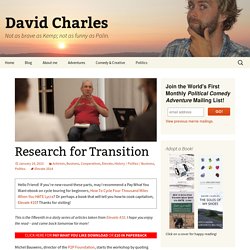
I hope you enjoy the read – and come back tomorrow for more! Michel Bauwens, director of the P2P Foundation, starts the workshop by quoting anthropologist Alan Page Fiske. Fiske describes four basic ways of interacting around resources. Principes des Communs. » Définir les biens communs #5 - Remix biens communs. Définir les biens communs #5, est la cinquième série de courtes vidéos de définitions des biens communs produite par Communautique et Gazibo pour le projet Définir les biens communs.
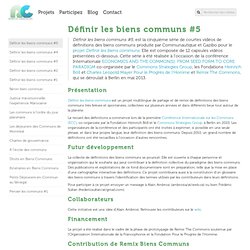
Elle est composée de 12 capsules vidéos présentées ci-dessous. Cette série à été réalisée à l’occasion de la conférence Internationale ECONOMICS AND THE COMMON(S): FROM SEED FORM TO CORE PARADIGM co-organisée par le Commons Strategies Group, les Fondations Heinrich Böll et Charles Leopold Mayer Pour le Progrès de l’Homme et Remix The Commons, qui se déroulait à Berlin en mai 2013. Présentation. Questions about Commons by Alain Lipietz.
Remarks by Alain Lipietz at Forum Social Mondial, in Belem, Brazil, regarding the book edited by Silke Helfrich, “Genos, bytes y emisiones: bienes comunes y ciudanidad” (Genes, bytes and emissions: commons and citizenship) and commons advocacy by the Heinrich Böll Foundation, Tuesday, January 27, 2009 The book edited by Silke Helfrich is absolutely remarkable.
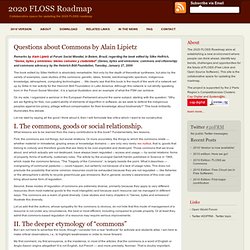
Not only by the depth of theoretical syntheses, but also by the variety of examples, case studies of the commons: genetic, lakes, forests, electromagnetic spectrum, indigenous knowledge, atmosphere, computing technologies … We clearly see that this book is the result of the work of a network set up by Silke in her activity for the Heinrich Böll Foundation in Latin America. Although this network is not strictly speaking born in the Forum Social Mondial , it is a typical illustration and an example of what the FSM can achieve. What lessons are to be learned from the many contributions to this book? Biens Communs La prospérité par le partage. FLOK Society en Équateur : et si cela changeait véritablement la donne. Il a été dit dans un article précédent qu’il suffit qu’un pays change ses règles du jeu pour que cela impacte tous les autres.
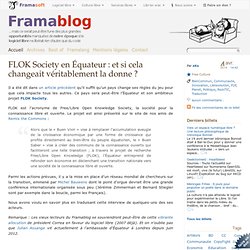
Ce pays sera peut-être l’Équateur et son ambitieux projet FLOK Society. [ #FlokSem ] Intégrer le paradigme des communs de la connaissance dans l’action et les politiques pour la transition (with images, tweets) · s_fredriksson. Silke Helfrich. = cofounder of the Commons Strategies Group with David Bollier (USA) and Michel Bauwens (Thailand).

"Silke Helfrich (Jena, Germany) has studied romance languages and pedagogy at the Karl-Marx-University in Leipzig. Since mid of the 1990s activities in the field of development politics, from 1996 to 1998 head of Heinrich Böll Foundation Thuringia and from 1999 to 2007 head of the regional office of Heinrich Böll Foundation in Mexico City focusing on globalisation, gender and human rights. Since 2007 she works as independent author and activist, working with a variety of international and domestic partners. Helfrich is the editor of several books on the Commons, among them: Who Owns the World?
The Rediscovery of the Commons, Munich 2009 (in : Genes, Bytes y Emisiones. David Bollier: "If there is one thing that Silke Helfrich has learned in her world travels, it is the cross-cultural appeal of the commons. But the commoners at that event also shared a great deal. Other languages. » 2014 » juillet - Remix biens communs. FLOK Society en Équateur : et si cela changeait véritablement la donne.
Pour en savoir plus sur les biens communs · Bpi. La connaissance en partage : une utopie en action. Le web des données laisse-t-il une place au bien commun ? Été lancé pour « la création d’un groupe de travail pour des données ouvertes et mises en commun » en janvier 2008 .
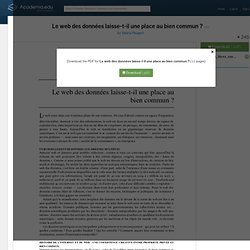
Au Royaume-Uni, c’est dès mars 2006 que deux journalistes du Guardian. Biens communs et numérique : l’alliance transformatrice. Quelles différences entre les biens communs et le communisme ? Quelle sont les similitudes divergences entre les traditions socialistes et l'émergence des idées et pratiques liées au P2P et des biens communs ?

Michel Bauwens, fondateur de la P2P Foundation, nous explique sa vision. Titre original : How does the idea of p2p and the commons differ from the socialist tradition? Dans cet article du journal Pagina 12, le journaliste Mariano Blejman écrit que je mets sur le même plan le matériel ouvert et socialisme. Séminaire 25-26 avril 2013. Version anglaise Les nouveaux enjeux de l'accès et de l'innovation partagée.
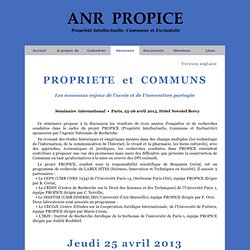
Brest en Biens Communs : Compte rendu de la réunion du 13 juin 2013. Cette année nous travaillerons en réseau avec de nombreuses villes en France mais aussi dans d’autres pays francophones. Biens communs : Commun, Commons, Communauté. Biens Communs. Elinor Ostrom ou la réinvention des biens communs. Première femme à obtenir un Prix Nobel d’économie (en 2009) pour ses développements sur la théorie des communs [1], Elinor Ostrom est décédée ce mardi 12 juin, à l’âge de 78 ans. Chercheuse politique infatigable et pédagogue ayant à cœur de transmettre aux jeunes générations ses observations et analyses, elle avait, malgré sa maladie, continué son cycle de conférences et la rencontre avec les jeunes chercheurs du domaine des communs au Mexique et en Inde. Récemment encore, elle exprimait son sentiment d’urgence à propos de la conférence Rio+20 qui se déroule actuellement [2].
Commons Champion: Elinor Ostrom (1933-2012) Winner of the Nobel Prize for her seminal work on shared resources Elinor Ostrom at the Festival the Commons last year in MInneapolis (Photo courtesy of Augsburg College.) Ostrom’s work debunked the Tragedy of the Commons theory, and was heralded in many developing nations as evidence that their traditions of communal resources and cooperation was not a violation of basic economic common sense, as many Western economic advisers warned. Elinor Ostrom, who shared the 2009 Nobel Prize in economics for her lifelong work studying how communities share resources, died June 12. She was 78. The only woman out of 69 Nobel Laureates in economics honored since 1969, Ostrom taught political science at Indiana University.
This international acclaim for her work was heralded in many developing nations as evidence that their commons-based traditions of cooperation and communal resources was not a violation of basic economic common sense, as many Western economic advisers warned.